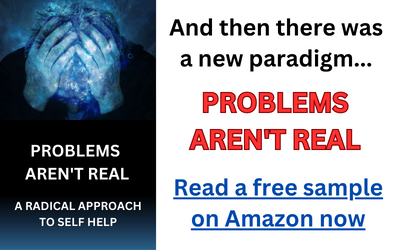I recently heard someone tell part of their life story. The story went something like this:
In order to have the money to meet my needs and desires I must go to work. I’m not happy about this because it prevents me from spending more time with my family, and I’d like to spend much more time with my family than I presently do, but it is my reality.
I’d guess most people would find no fault with this story at all, and probably tell a very similar story themselves. The story certainly fits in with the typical life narrative, doesn’t it?
You have to work hard. Money doesn’t come easily. Life is difficult.
But accepting and repeating this story would be viewed quite differently, wouldn’t it, if it was widely accepted that our lives are made from the stories we tell. In other words, if the external realities of our lives was based upon our focus and thinking — the stories we tell — then many of us would take care to tell our stories much differently than we typically do.
In fact there is an orientation wherein we do create our life circumstances through our focus and thinking — through the stories we tell. This orientation has been in awareness for generations and even since earliest documented history, and has been referenced in a variety of spiritual texts including the Bible.
In recent times this orientation has received a great deal of attention under its newest label: the Law of Attraction. The Law of Attraction describes manifesting life circumstances through intentional mental focus. In other words, one intentionally focuses upon what it is that they would like to experience.
The Law of Attraction came into mass awareness through the movie The Secret, and has seemingly been heavily criticized since The Secret was released. The many critics of the so-called Law of Attraction often insist upon characterizing it as wishing for something — typically money or other material things — and seeing this wish get granted. In fact a more accurate description is sustained focus upon some desire, including writing it out, repeating it aloud, and thinking about it daily.
Even with this revised definition there would likely still be many critics who insist that intentional focus will not, and cannot, lead to physical manifestation. In fact the person telling the story from the beginning of this writing strongly resisted the suggestion of telling a different story, one where they had sufficient income — financial abundance even — without having to work a job. They were adamant that this was not realistic and so would not happen.
They continue then to tell their story of much time spent working for money, and this continues to be their reality. But is this reality a cause or an effect? In other words, are they telling the story of their reality or are they creating their reality by the story they tell? Again, most people insist that mental focus does not create a physical reality yet this person — themselves a critic of the notion that mental focus creates a physical reality — told me of a television show they’d seen where lottery winners described mentally focusing upon winning, and then it actually occurred.
The critic likely considered it a coincidence, a humorous one because I’d told them about the concept of intentional manifestation and then they saw it on the television show about lottery winners. The lottery winners however are not unique in seeing this strategy come to fruition. The book Think And Grow Rich, written in the 1930’s, tells of various great successes from late 19th and early 20th century America who successfully used the very same strategy: envisioning a desired outcome.
More coincidence?
Critics will say that hard work ultimately led to these successes, but according to the book this was not always so. The common tactic was always envisioning a desired outcome however, and then mentally focusing upon its manifestation. Beyond this example, there are many people who have worked very hard over the course of their lives and have little if any wealth to show for it. There are also people who have amassed great wealth while working much less than the average person does.
It is absolutely not so that amassed wealth is directly correlated to frequent or hard work. Many wealthy celebrities hardly work at all. And even those individuals who make great wealth through private industry often don’t work as hard as their underlings do, and are always much better compensated for the work they actually do. People who inherit wealth, of course, aren’t required to do any work.
Yet there continues to be an insistence, a belief also held by the skeptic mentioned throughout this article, that amassed wealth will only come through hard work over time. This is the story, this is the reality. But could the reality be changed if the story was?
What if the skeptic tried the tactic of the lottery winners, and financial successes from the book Think And Grow Rich, and told a different story? Something like this:
I am financially abundant without having to work a job. Since I am financially abundant and don’t have to put in time at a job, I’m able to spend lots of quality time with my family.
Most people would find a story like this to be so at odds with their belief and value systems that they would never make the attempt to regularly tell it. (These people are very likely unaware that the more we tell ourselves a story, the more it becomes embedded into our belief system: our story, in other words, becomes more real to us the more we tell it.) So they are certainly not going to see results from the Law of Attraction or intentional manifestation, or whatever one wants to call this method, because they have rejected it right from the start.
But what about you? Will you continue to tell the same story you’ve been telling? Or will you follow the advice of Jesus when he said Therefore I tell you, whatever you ask for in prayer, believe that you have received it, and it will be yours and tell your story as you want it to be — and continue to tell it exactly this way until it is.
(Get more information about the Law of Attraction Here and Here.)

